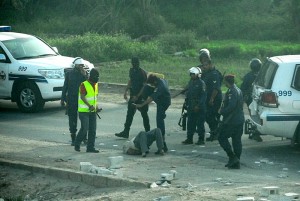I just attended an eye-opening roundtable discussion with several members of Saudi Arabia’s Majlis al-Shura, the advisory council to King Abdullah, at the New America Foundation here in Washington.
It was a great chance to assess the Saudi government’s take on the change sweeping the Arab world, and where it is positioning itself. It was hard to conclude that its location is currently on the wrong side of history.
The level of denial about Bahrain, which is the kingdom’s key concern in the region, was startling. One delegate said there was “no major crackdown” in Bahrain, despite the fact that the security forces opened fire in Manama’s Pearl Roundabout, You-Tube footage can be seen of protestors being shot at point blank range, the main opposition newspaper has just been shut down amid the emergency rule imposed a month ago. Not forgetting that Gulf Co-operation Council forces agreed to a cry for help from Bahrain’s royal family, resulting in the Saudi-led intervention of 1,000 troops.
Another shura member said that Bahrain’s Shia community, which is 60 percent of the population ruled by the Sunni monarchy, was essentially content and enjoyed a decent standard of living. “Bahrain is a very serene island,” he said. “What was happening in Bahrain was instigated by foreign forces”.
This is, of course, the sort of blind, blame-all-others approach that was allocated by Tunisian and Egyptian leaders as their regimes were crumbling.
The conversation revealed a level of concern, or some might say paranoia, about the Shias and Iranian influence that is rarely appreciated outside the region. From the Saudi point of view, a serious challenge to a quasi-absolute Sunni monarchy with a Shia majority is anathema – a “thick red line” as one speaker called it.
That is understandable, but the Saudis’ failure to accept that Bahrainis had any legitimate claims for political reform and greater equality was alarming. There was an admission from one panelist “something must be done” about Bahrain’s unpopular prime minister, who initially at least was the chief target of protesters’ anger. But that was as far as it went, and that panelist stressed that his was not the majority view in Saudi Arabia.
Failure in Bahrain to address Shia grievances will only aggravate Shia populations elsewhere in the region and aid Iran’s ambition of becoming a true regional power. That would be against not only Saudi Arabia’s interests, but the West’s.
By Alex Spillius


















